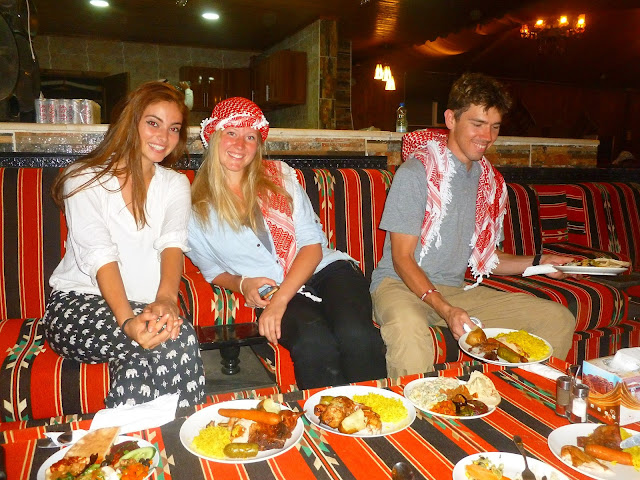I was truly blessed to be able to have gone on BYU's Study Abroad program to Amman, Jordan this past semester. This could not have been possible without my QFI Education Scholarship awarded to me last May.
Prior to my experiences abroad, I had only completed 12 university credits of Arabic. Needless to say I was terrified to start my life in Jordan where I would be expected to only speak Arabic. One of our assignments while attending Qasid Institute under the Auspices of our BYU professors was to include at least two hours of speaking with natives in our everyday schedules. At first, I found this to be the most challenging part of completing the homework but after making friends in various places (a little salon near our apartment, downtown shops and bookstores, Qasid institute, the falafel stand next to our school, our neighbors, some refugee families we taught English to, etc...) I began being a lot more comfortable talking to them in Arabic.
One of my most memorable moments was on one of our regular Tuesday trips to the church in Marj Al-Hammam for the purpose of teaching English to Iraqi refugees from Qaraqosh. I really grew to love these people and especially became attached to the children I taught. On one of our trips, we had another American come to teach English with us but since we mostly spoke Arabic in the classes, I ended up translating from the kids to her and vice versa. I hadn't considered myself fluent in anyway before then (and I'm still learning the language) but this experience helped me recognize that I was able to communicate. Here is a picture of our group with the Iraqis.
Learning to communicate opened a whole other world to me. It made me realize that no one can actually understand a refugee until he/she has spoken to them and become their friend. Michael Gove, an English politician, was absolutely right when he said, "Learning a foreign language, and the culture that goes with it, is one of the most useful things we can do to broaden the empathy and imaginative sympathy and cultural outlook of children." I am so grateful to have been able to go to Jordan and learn Arabic and still love every opportunity I have to further my understanding of the Arab culture.
Although my main goal in going to Jordan was learning the Arabic language, I got to go on so many adventures and explore some of the coolest parts of Jordan. This is a picture of my friend and me in the old roman amphitheater overlooking downtown Amman.
Taken in Wadi Rum at a Bedouin Camp we stayed at for one night. The food in front of us is called Zarb and is one of the best foods I have ever eaten. To cook the meat, they dig a hole in the sand and put the meat along with some vegetables wrapped in some foil in the ground and recover it with sand. After a few hours when the food has had time to cook, they remove the sand and take out the zarb which is soaked in all the flavors of lamb, chicken, carrots, onions, zucchini and potatoes. The whole dish is amazing and is served with turmeric rice along with traditional Arab salads and other raw and picked vegetables, and of course, khobuz w hummus! Arabs have such a gastronomically rich culture and historical background. I would say I found about half of my pleasure in being in the Middle East from the food, which is a lot considering my love of the Arabic language and the Arab peoples and culture.
This picture was taken in front of the treasury (Al-Khazneh) in Petra. We spent a whole day wandering around and discovering the monastery, the tombs, and even some sacrificial alters on top of high mountains. Petra is probably the most awe-inspiring place I have ever been to.
To end I just want to say that learning Arabic has only filled my life with great adventures and new deeper perspectives and great friends. I am majoring in International Relations with an emphasis in Middle Eastern Studies and a double major in Arabic. I hope my languages will help in ameliorating cross-cultural relations.







































